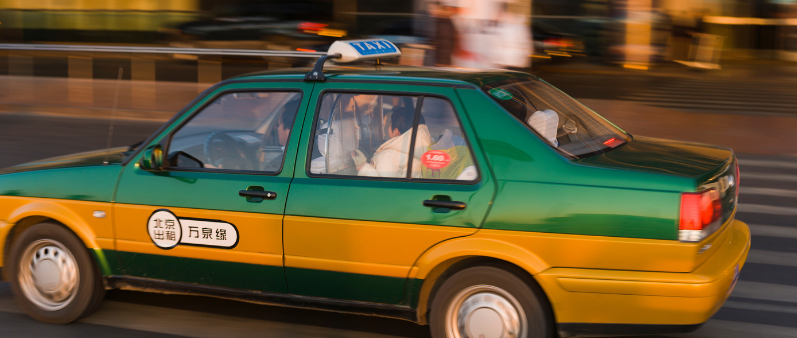
Taking a Taxi in Beijing – Understanding the Beijing Hua Dialect
Taking a Taxi in Beijing: the Beijing Hua
So, you have finally arrived in China, and want to take a taxi to your hotel or other destination. You assume you can simply give the driver your address, and you’ll arrive at your destination in a few minutes. Wrong. You are being optimistic. For a foreigner, taking a taxi in China is difficult. But taking a taxi in Beijing can be a nightmare.
Beijing is unlike Shanghai, where you can typically find some English speakers, especially in tourist spots. In Beijing, taxi drivers, as well as most waiters, receptionists, and service workers, do not speak any English. You will either need to have a small grasp of Mandarin or be prepared for long exchanges of Google translate texts.
Why is it so Hard to Take a Taxi in Beijing?
I remember the first day of my first visit to China. I needed to go from my university to a hotel in the same neighborhood. And I could speak Mandarin, so that would be easy, I had assumed.
I called a taxi and we spent one full hour driving in circles. At some point, I thought I would never return to my hotel. I had this same feeling often in the months that followed.
What’s Wrong With Beijing Taxi Drivers?
The drivers often don’t know the streets. Whenever I found myself explaining the way to the drivers, I thought that was crazy. They were supposed to know the streets, right? Then I discovered that Beijing, the most populated capital city in the world, is half the size of Belgium. From that point, I became more sympathetic to the taxi drivers. Decently knowing most of the neighborhoods was a near impossibility.
The distances are very long, so it rarely takes less than half an hour to get to your destination. If you check a map and see you are just on the next street, remember it could take you a long time to get there, even if it looks close!
Beijing is so crowded there are always scores of people looking for a taxi, no matter the time of day or night. Hailing a taxi is a competitive sport. People will wave, shout, and take your place. If you manage to finally get a taxi to stop, always jump inside before giving your destination to the driver. Otherwise, someone else may slip in while you’re negotiating through the window.
The Wonder of the Beijing Hua Dialect
When you are finally sitting in the taxi, you will have the first encounter with one thing that will constantly accompany you during your stay in the city: the notorious Beijing Hua (北京话), that much-feared Beijing dialect!
All the taxi drivers proudly speak it. You cannot escape from it. Sorry.
On paper, Mandarin (the official language of China) and the Beijing dialect are almost identical. This is mainly because Standard Chinese is based on Beijing pronunciation.
However, some differences make “Beijingers” sound like…they have a sock in their mouth. To express it in a more formal way, we are talking about the érhuà (儿化) or rhotacization.
This phonological phenomenon consists of basically adding the “ér” (儿) sound (transcribed in IPA as [ɚ]) to Chinese syllables. Some words used with this final sound have been even recognized as official in Standard Chinese, such as:
哪儿 nǎr (where)
一点儿 yìdiǎnr (a little)
好玩儿 hǎowánr (fun)
Since people from the south of China might have problems pronouncing this er sound, they usually replace these words altogether with the following:
哪里 nǎlǐ (where)
一点 yìdiǎn (a little)
好玩 hǎowán (fun)
Other examples:
一瓶 (yìpíng, one bottle) → 一瓶儿 (yìpíngr)
公园 (gōngyuán, public garden) → 公园儿 (gōngyuánr)
小孩 (xiǎohái, small child) → 小孩儿 (xiǎoháir)
事 (shì, thing) → 事儿 (shìr)
There are also some words with the er that are used in Beijing Hua dialect, but they would not be used or even understood by people from other parts of China:
倍儿 bèir – very, especially (referring to manner or attribute)
蔫儿 niār – no backbone, spiritless
搓火儿 cuōhuǒr – to be angry
Beijing Hua Taxi Phrases:
Here are some useful phrases to help you manage the taxi stress.
去那儿 (qù nǎr) → Where to?
打车 (dǎ chē) → Take a taxi
出租车 (chūzūchē) → Taxi
零钱不用找了 (língqián búyòng zhǎole) → Keep the change.
我要下车了 (wǒ yào xià chē le) → I want to get off.
让我下车 (ràng wǒ xià chē) → Let me get off.
请给我车费收据 (qìng gěi wǒ chēfèi shōuju) → Please give me the taxi fare receipt.
请送我到这里 (qǐng sòng wǒ dào zhěli) → Please take me here.
慢点开车 (màn diǎn kāi chē) → Drive slowly.
交通堵塞 (jiāotōng dǔsāi) → Traffic jam.
还要多久 (Hái yào duōjiǔ?) → How much longer?
请在这里稍等一下儿 (qǐng zài zhèli shāo děng yíxià) → Please wait here for a moment.
到。。。多少钱 (dào … duōshǎo qián?) → How much is it to…?
Need Mandarin Learning On the Go?
Pimsleur has got you covered! Enter code BLOG for an extra discount!
No Comments for "Taking a Taxi in Beijing – Understanding the Beijing Hua Dialect"